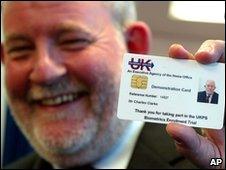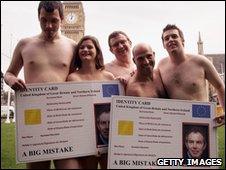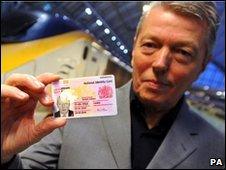Timeline: ID cards
- Published

Several home secretaries have come and gone during the ID card process
While Labour talked about ID cards for many years, they only became a plastic reality for UK citizens in November of last year.
And now they will not even make it to their first birthday as the coalition government is to scrap the entire project - the cards and the corresponding national identity register.
The Conservatives and Liberal Democrats have long opposed the scheme and say they want to reverse what they see as "an erosion of civil liberties" under Labour.
Here's how the ID cards evolved and what was said about them:
July 2002:
Home Secretary David Blunkett outlines plans for a national identity card - the first in the UK since wartime identity documents were abandoned over 50 years ago. A six-month consultation is launched.
Labour had mooted the idea before as a way of combating terrorism after 9/11, but now it was being billed as an "entitlement card" to combat benefit fraud and illegal workers.
The Home Office estimates the cost of introducing an entitlement card would be between £1.3bn and £3bn - the higher estimate would be for a card incorporating state-of-the-art iris or fingerprint recognition.
Mr Blunkett's Tory predecessor Michael Howard had wanted to introduce a national identity card scheme but shelved the idea until after the 1997 election, which the party lost.
January 2003:
Labour hints it may drop the idea of "entitlement cards" amid mounting opposition from civil liberty groups and concerns about cost.
Opponents say that, intentionally or not, identity cards would single out Britain's minority communities.
June 2003:
The results of the public consultation are in and the Home Office admits that more than 5,000 of the 7,000 responses were against the scheme.
September 2003:
Mr Blunkett says he wants a bill for the introduction of the cards to be included in the Queen's Speech. PM Tony Blair appears to back the idea but the Cabinet is split.
Mr Blunkett said they would ensure "people don't work if they are not entitled to work, they don't draw on services which are free in this country, including health, unless they are entitled to".
He said it would also mean "when we find people we can identify quickly that they are not entitled and get them out".
November 2003:
Mr Blunkett gets his wish as measures to create a national identity card system are announced in the Queen's Speech. But it has been delayed until later in the decade to include biometric data. It is suggested ID cards may be compulsory in the UK by 2013.

NO21D campaigners get their message across
Mr Blunkett suggests the card would cost £35, and says they will aid counter-terrorism, stop illegal working, cut benefit fraud and abuse of public services, and prevent identity theft.
Earlier in the month, Met Commissioner Sir John Stevens calls for the urgent introduction of a compulsory identity card as an "essential" weapon in the fight against terrorism.
October 2004:
Plans to combine new compulsory identity cards with passports and driving licences are dropped. A free-standing card is considered the most attractive option.
November 2004:
ID cards bill is launched. Under the revised proposals a national database will be created holding personal information such as names, addresses, and biometric information for all those who are issued with a card.
The Home Office says people will pay £85 for a passport and ID card together or an undecided fee for a separate ID card.
The first cards would be issued in 2008 and Mr Blunkett suggests Parliament could decide in 2011 or 2012 whether to make it compulsory for everybody to own one, although not to carry it.
December 2004:
After Mr Blunkett's resignation, the new Home Secretary Charles Clarke vows to plough on with plans for ID cards.
"ID cards are a means to creating a more secure society," he said.
March 2006:
After several defeats in the House of Lords, a compromise is reached and the Identity Cards Act became law.
November 2008:
Rollout of compulsory ID cards for foreign nationals begins, replacing paper documents.
An 18-month trial involving workers at Manchester and London City airports is proposed but is met with union opposition.
June 2009:
Home Secretary Alan Johnson drops plans to make ID cards compulsory for pilots and airside workers at Manchester and London City airports.
Mr Johnson admits the cards should not have been sold as the "panacea for tackling terrorism" which he said had been responsible for "messing up" the debate.
July 2009:
Identity cards are unveiled but Mr Johnson says they will not be compulsory for UK citizens.

A former home secretary using his ID card to travel to Brussels last year
The government had originally wanted them to be compulsory (though that would have required a vote in Parliament).
But it is still pressing ahead with the main elements of the ID card scheme - from 2011, British citizens aged 16 over who apply for a passport will automatically be registered on the national identity database.
November 2009:
People living in Greater Manchester become the first UK residents able to buy an identity card. The biometric ID card costs £30 and can be used to travel passport-free across the EU.
The ID card should be available nationwide in 2011 or 2012.
January 2010:
Scheme extended across NW England.
February 2010:
ID cards available to 16 to 24-year-olds in London.
May 2010:
A total of 15,000 cards are in circulation. But the cards will soon be useless as the coalition announces it will scrap the scheme. It is said to have cost £5bn, although the London School of Economics has said the true bill would be between £10bn and £20bn.
The ID card system for foreign nationals from outside the European Economic Area will remain in place. Some 200,000 cards - known as biometric resident permits - have already been given to migrant workers, foreign students and family members.